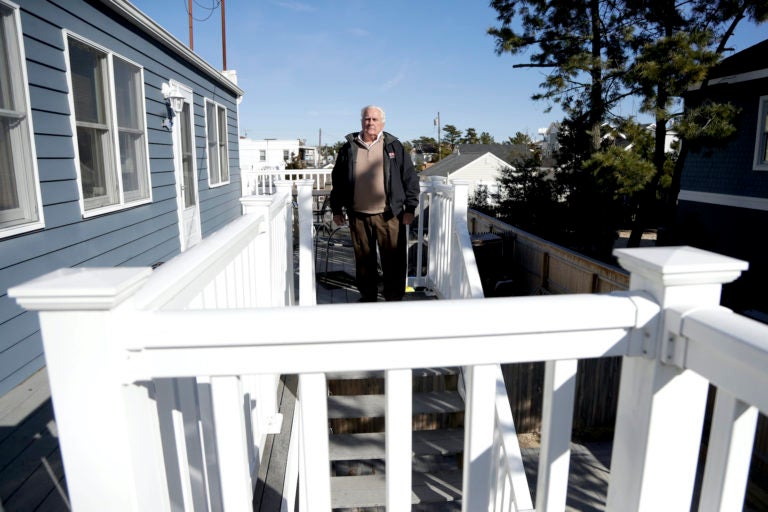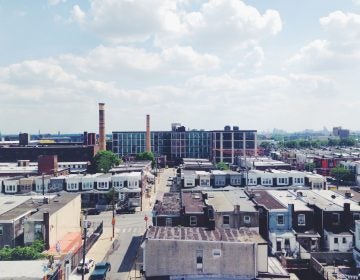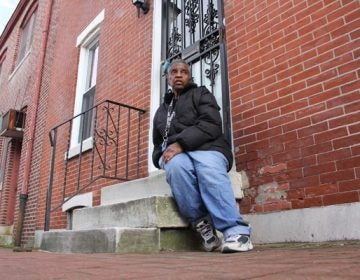N.J. property taxes bounced back in 2019
The average New Jersey property-tax bill increased by nearly $200 last year as the rate of growth also picked up in 2019 compared to the last few years.

In a photo taken Friday, Jan. 11, 2019, Vince Farias poses for The Associated Press outside one of his vacation rental properties in Surf City, N.J. (Julio Cortez/AP Photo)
This article originally appeared on NJ Spotlight.
–
The average New Jersey property-tax bill increased by nearly $200 last year as the rate of growth also picked up in 2019 compared to the last few years.
The uptick to a record high of $8,953 in 2019 came even as Gov. Phil Murphy, a first-term Democrat, has attempted to make progress on the property-tax issue, including by increasing state aid to local school districts and encouraging more local governments to cut costs by pooling services.
The average pace of growth in property-tax bills actually increased from Murphy’s first year in office to his second. Still, the year-over-year increase of just over 2% remained well below those from roughly a decade ago, when bills rose an average of 5% or more.
Murphy issued a statement along with the new data, highlighting the overall stability in New Jersey property-tax bills. He also pointed to the state’s rising ratable base, which pushed past the $1 trillion mark in 2019.
“Statewide property values have grown more in the first two years of my administration than at any point since the Great Recession,” Murphy said. “That’s what we call progress.”
Revenue from property taxes
In all, more than $30 billion in revenue was raised through local property taxes in 2019, according to the new figures released by the Department of Community Affairs. That’s nearly as much as the state generates from its three largest sources of revenue combined, which are the income, sales and corporate business taxes.
About 52% of the total haul from property taxes last year went to K-12 schools. Splitting the rest were municipal governments, with 30%, and counties, which received 18%.
The average statewide property tax bill increased by a total of $186 in 2019, or 2.12%. A 2% cap on annual property levy increases that was enacted during the tenure of Murphy’s Republican predecessor, Chris Christie, has coincided with the slowed growth in average bills that’s occurred over the past decade. But the 2% cap provides several exceptions for increases larger than 2%.
Still, annual growth in the state’s average property-tax bills had stayed under the 2% benchmark for the past several years, including in 2018, Murphy’s first year in office. Bills rose on average by less than 1% that year. But last year’s increase reversed the downward trend and was the largest since 2016, both by percentage and in raw dollars.
SALT deduction still stings
Adding insult to injury for many New Jersey homeowners is the $10,000 cap on the federal income-tax deduction for state and local taxes known as SALT that was enacted by President Donald Trump in 2017.
A total of six New Jersey counties now have average property-tax bills that top the $10,000 threshold, led by Essex County, $12,531; Bergen County, $12,009; and Union County, $11,895. At the other end of the spectrum were Cumberland County, $4,412; Cape May County, $5,294; and Salem County, $5,839. Detailed data by the municipality is available in NJ Spotlight’s searchable database.
Murphy increased state funding for K-12 schools in both of his first two state budgets, and he is attempting to do so again in the $40.85 billion spending plan for fiscal year 2021 that he put forward last week. The governor has billed such spending as helping greatly to ease pressure on property-tax bills, citing the major share of annual property taxes that are raised locally each year to fund K-12 districts. But some districts have also seen their state aid reduced due to a funding reform that was enacted in 2018.
Other Murphy administration efforts to address the property-tax issue include the encouragement of shared-services agreements among local governments and a push to control public-worker health care costs by reforming medical and prescription drug coverage options.
No help for municipalities
But even as funding for K-12 school districts has increased during Murphy’s tenure, he has continued to hold state aid to municipalities flat throughout his tenure. The same trend has also been followed for the state’s most popular property-tax relief program, the Homestead benefit. Both the size of Homestead tax credits and the income limits to qualify for them have not been changed in roughly a decade, eroding the effectiveness of the credits since property-tax bills have steadily increased over the past decade. (The average New Jersey property tax bill was $7,576 in 2010.)
Murphy did work with lawmakers in 2018 to increase the size of the state income-tax deduction for property taxes, pushing it from $10,000 to $15,000. The current state budget is also funding a higher income limit for the Senior Freeze relief program.
WHYY is your source for fact-based, in-depth journalism and information. As a nonprofit organization, we rely on financial support from readers like you. Please give today.




